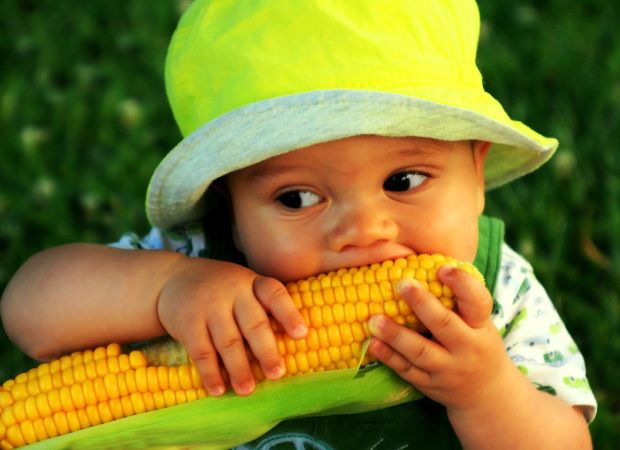Massive shifts have been made in nutrition and food in recent years, from lab-grown meat to the rising interest in plant-based eating. Coupled with these innovations are also various messages around what’s healthier for your family, so it’s understandable that the sheer variety of products on shelf right now could leave new parents feeling overwhelmed. How can you make healthy, informed decisions for your family?
What to feed your baby when introducing solids
In Weaning Sense, occupational therapist Meg Faure and paediatric dietitian Kath Megaw talk about the importance of offering food that is as close to its natural form as possible. While processed rice cereal and ready-to-eat jarred food can make weaning easier, they’re often packed with fillers, modified starch, preservatives, sweeteners, colourants and flavourings – all ingredients your baby definitely doesn’t need! The best way to ensure your baby is eating “real food” is to offer them fresh, seasonal fruit and vegetables.
Must the produce my baby eats be organic?
You may have been told that organic food is far healthier than other foods, but the truth is it’s also far more expensive! So, is eating organic food really worth the extra cost?
Meg and Kath acknowledge that organic foods can provide certain benefits. For example, organic animal products contain healthier fats; organic meats contain fewer antibiotics; and organic fruits and vegetables are sprayed with fewer pesticides. But, they say, there’s no scientific evidence that says organic foods provide major health benefits when compared to non-organic foods.
Their recommendation? If you can afford it, choose organic meats, dairy and eggs. When it comes to fruits and vegetables, choose seasonal, locally grown produce. If you want to use a certain fruit or vegetable that isn’t in season, choose frozen over canned, as frozen food usually contains less added salt and sugar, and is frozen when at its freshest.
ALSO READ: A quick guide to organic food and knowing what to buy
Should my baby avoid GMO foods?
GMO stands for “genetically modified organism” and it’s become increasingly harder to fully avoid genetically modified foods. With climate change causing havoc with crops and farming around the world, and the global population increasing rapidly, GM foods could be the answer. But are GM foods harmful for your baby?
The reality is that there isn’t enough research to say one way or the other. Some studies have shown that GM foods are harmful to animals, while others have demonstrated that certain GM foods could actually offer more nutrients than their non-GM counterparts. In time to come, we may have a better understanding of their impact, but for now, you can limit your family’s exposure to GM foods if you prefer. The easiest way to do this is to, once again, choose fresh, seasonal produce. However, if your baby has eaten genetically modified foods, know that there certainly isn’t a consensus that it will cause your child any harm.
The bottom line is to choose healthy, fresh, seasonal produce whenever possible. This is really the best way to ensure you expose your baby to different foods and nutrients while also being the more budget-friendly option.
For more around what to feed your baby, buy Weaning Sense or click here to listen to the Sense podcast.

